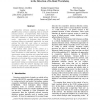Free Online Productivity Tools
i2Speak
i2Symbol
i2OCR
iTex2Img
iWeb2Print
iWeb2Shot
i2Type
iPdf2Split
iPdf2Merge
i2Bopomofo
i2Arabic
i2Style
i2Image
i2PDF
iLatex2Rtf
Sci2ools
129
click to vote
ACSAC
2007
IEEE
2007
IEEE
Countering False Accusations and Collusion in the Detection of In-Band Wormholes
Cooperative intrusion detection techniques for MANETs utilize ordinary computing hosts as network intrusion sensors. If compromised, these hosts may inject bogus data into the intrusion detection system to hide their activities or falsely accuse well-behaved nodes. Approaches to Byzantine fault tolerance involving voting are potentially applicable, but must address the fact that only nodes in particular topological locations at particular times are qualified to vote on whether an attack occurred. We examine these issues in the context of a prototype distributed detector for self-contained, inband wormholes in OLSR networks. We propose an opportunistic voting algorithm and present test results from a 48-node testbed in which colluding attackers generate corroborating false accusations against pairs of innocent nodes. The results indicate that opportunistic voting can instantaneously suppress false accusations when the network topology and routes chosen by OLSR provide a sufficient numb...
ACSAC 2007 | Intrusion Detection | Intrusion Detection Techniques | Opportunistic Voting | Security Privacy |
| Added | 02 Jun 2010 |
| Updated | 02 Jun 2010 |
| Type | Conference |
| Year | 2007 |
| Where | ACSAC |
| Authors | Daniel Sterne, Geoffrey Lawler, Richard Gopaul, Brian Rivera, Kelvin Marcus, Peter Kruus |
Comments (0)

